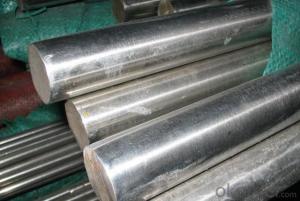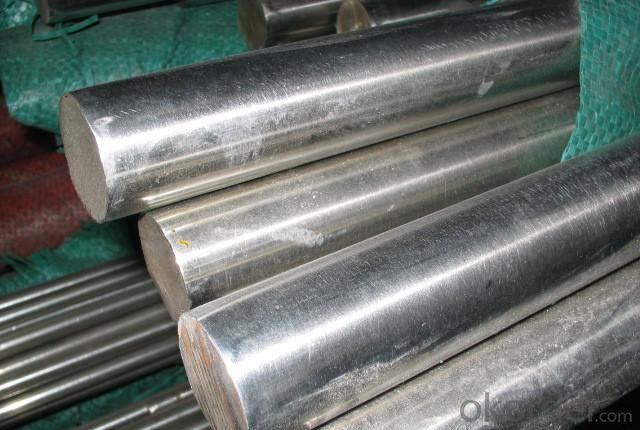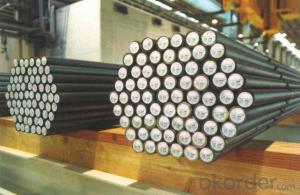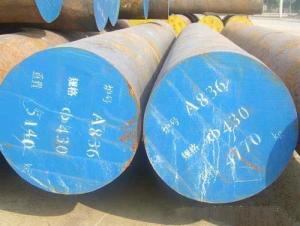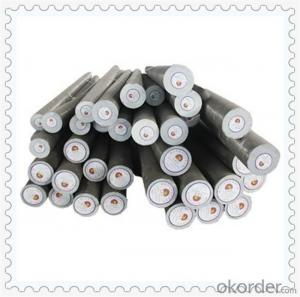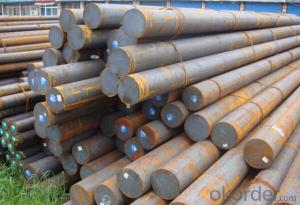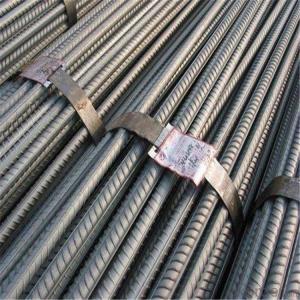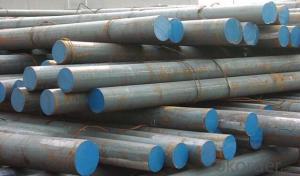Alloy Steel SCM435 Bar Made In China
- Loading Port:
- Tianjin
- Payment Terms:
- TT OR LC
- Min Order Qty:
- 25 m.t.
- Supply Capability:
- 50000 m.t./month
OKorder Service Pledge
OKorder Financial Service
You Might Also Like
Specification
Alloy Steel SCM435 Bar Made In China
Product description:
1. Produce Standard: GB, AISI, ASTM, SAE, EN, BS, DIN, JIS
2. Produce processes: Smelt Iron -EAF smelt Billet - ESR smelt Billet -Hot rolled or forged get the steel round bar and plate
3. Heat treatment: Normalized / Annealed / Quenched+Tempered
4. Quality assurance: All order we can received third party inspection, You can let SGS, BV,.. and others test company test and inspect our products before Goods shipping.
Chemical Composition(%):
C | Si | Mn | Cr | Mo | Ni | P | S |
0.32-0.40 | 0.20-0.40 | 0.40-0.70 | 0.80-1.10 | 0.15-0.25 | ≤0.30 | ≤0.035 | ≤0.035 |
Applications:
35CrMo(A30352)/4135/SCM435/34CrMo4(1.7220) alloy structural steel
35CrMo(A30352)/4135/SCM435/34CrMo4(1.7220) alloy structural steel is used to be manufactured all kinds of important parts which can bear impact, crankle, high heavy load, such as the herringbone gear of the rolling machine, bent roller, plumbing bar, connecting rod, fasteners, spindle of the steamer engine, axle, driving parts of engine, large motor reel, perforator of the oil machinery, boiler bolt whose working temperature is below 400°C, nut whose working temperature is below 510°C, conduit of the high-pressure seamless thick wall in the chemical machinery, etc.
Advantages:
1) ISO9001:2008 certified company.
2) Quality & Quantity Assurance with competitive prices.
3) Delivery & dealings as per Commitment.
4) Highly experience qualified production and sales team.
5) Your satisfaction is guaranteed according your demand.
Product Show:
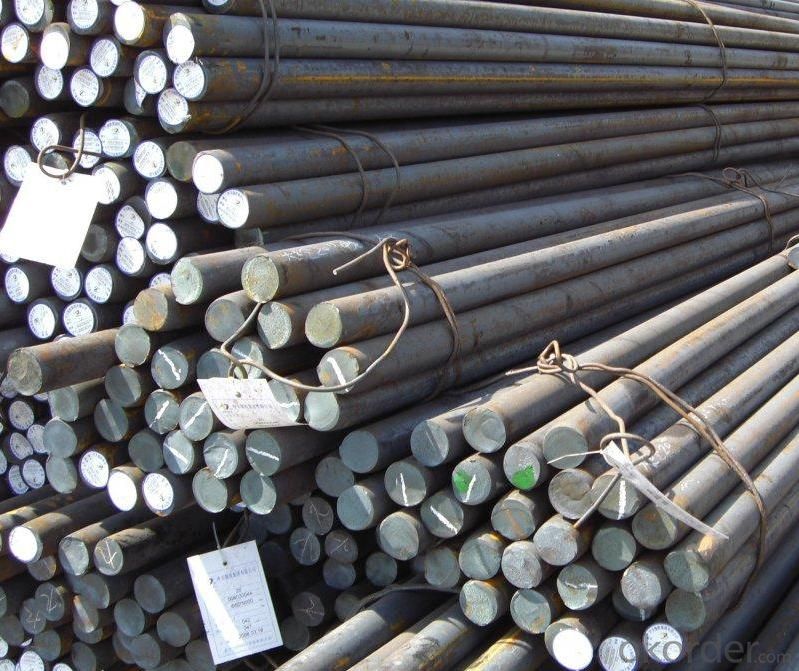
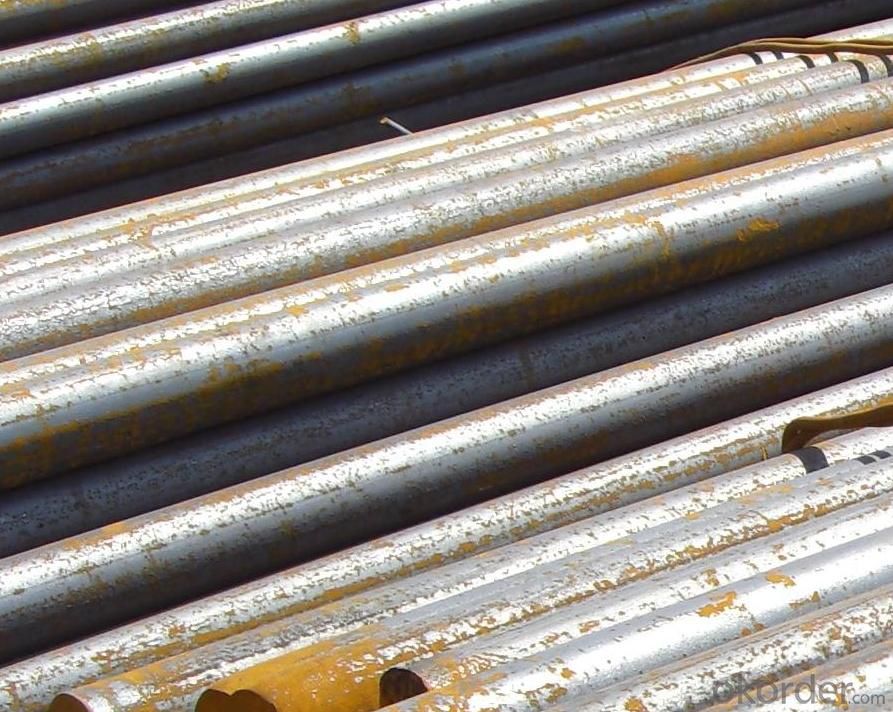
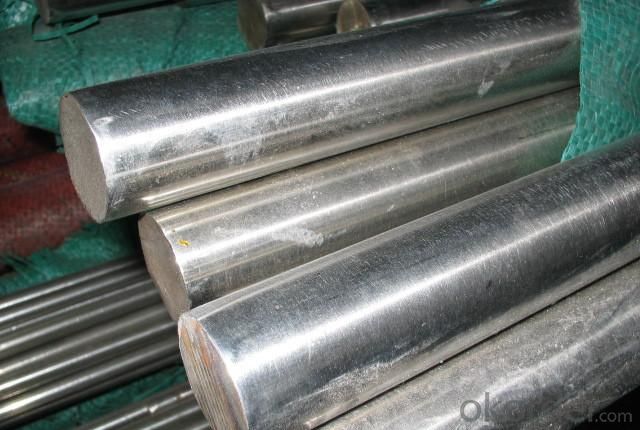
- Q: What are the main applications of special steel in the agricultural sector?
- Special steel has various applications in the agricultural sector, including the manufacturing of agricultural machinery and equipment such as tractors, plows, and harvesters. It is also used for constructing storage silos, irrigation systems, and fencing materials. Additionally, special steel is utilized in the fabrication of cutting tools, blades, and parts for farming implements, ensuring durability and high performance in challenging agricultural environments.
- Q: How does special steel contribute to the aerospace landing gear industry?
- The aerospace landing gear industry relies heavily on special steel to ensure safe and efficient aircraft landings. Special steel is essential for providing the required strength, durability, and resistance to extreme conditions. One vital aspect of landing gears is their high tensile strength, as they bear the weight of the aircraft during takeoff, landing, and taxiing. Special steel alloys, such as ultra-high strength steels, are specifically engineered to resist deformation and endure the immense forces exerted on the landing gear. These steels possess remarkable mechanical properties, enabling them to maintain their structural integrity under heavy loads. Additionally, special steel used in aerospace landing gears must exhibit exceptional fatigue resistance to withstand the repeated stress cycles experienced during each landing. Fatigue failure of landing gears can have catastrophic consequences, so the use of high-quality steel ensures an extended service life and reduces the risk of failure. Moreover, special steel alloys used in landing gears must possess outstanding corrosion resistance. Aircraft operate in diverse environments, including humid and salty conditions, which can accelerate corrosion. By utilizing corrosion-resistant steels, the landing gear components can endure these harsh conditions and maintain their performance and safety over time. Furthermore, the unique properties of special steel alloys allow for weight reduction in landing gear components. The aerospace industry constantly strives to decrease aircraft weight to enhance fuel efficiency and performance. Special steel alloys, such as high-strength low-alloy (HSLA) steels, provide the perfect balance between strength and weight, enabling the design of lighter landing gear components without compromising safety or durability. In conclusion, special steel is indispensable to the aerospace landing gear industry due to its ability to provide the necessary strength, fatigue resistance, corrosion resistance, and weight reduction capabilities required for safe and efficient aircraft landings. By utilizing special steel alloys, the industry can ensure the reliability and longevity of landing gear components, thereby contributing to the overall safety and performance of aircraft.
- Q: How does special steel contribute to the food processing aftermarket industry?
- Special steel plays a crucial role in the food processing aftermarket industry by offering several important benefits that contribute to the overall efficiency, safety, and productivity of food processing equipment. Firstly, special steel is known for its exceptional corrosion resistance properties. In the food processing industry, where equipment comes into contact with various acidic and corrosive substances, using special steel ensures that the machinery remains resistant to rust and contamination. This, in turn, helps maintain the hygiene and quality standards of food processing operations, reducing the risk of foodborne illnesses and contamination. Secondly, special steel possesses high strength and durability, enabling food processing equipment to withstand the demanding conditions of heavy usage and continuous operations. The robustness of special steel ensures that the equipment remains reliable, minimizing the risk of breakdowns or malfunctions during critical production processes. This leads to increased operational efficiency, reduced downtime, and improved production output. Furthermore, special steel can be tailored to specific applications, allowing manufacturers to design and produce equipment that meets the unique requirements of the food processing industry. Special steel alloys can be customized to possess specific properties such as heat resistance, wear resistance, or hardness, depending on the specific processing needs. This versatility ensures that the equipment can handle different types of food products, processing techniques, and operating conditions, resulting in enhanced versatility and adaptability in the food processing aftermarket industry. Additionally, special steel's compatibility with various cleaning and sterilization processes makes it ideal for food processing equipment. The material can withstand high-temperature cleaning methods, such as steam or chemical cleaning, without deteriorating or losing its structural integrity. This ease of cleaning and sterilization contributes to maintaining the highest standards of hygiene and sanitation in the food processing industry. In conclusion, special steel's corrosion resistance, strength, durability, customization options, and compatibility with cleaning processes make it an invaluable material in the food processing aftermarket industry. Its contribution to equipment reliability, hygiene, and productivity ensures that food processing operations can meet the stringent quality and safety standards required in this sector.
- Q: What are the different surface cleaning methods for special steel?
- Maintaining the quality and appearance of special steel requires the use of various surface cleaning methods. Here are some options: 1. To remove dirt, rust, or other contaminants from the steel surface, mechanical cleaning utilizes tools like wire brushes, sandpaper, or abrasive pads. This method effectively eliminates loose particles and light stains. However, it may not be suitable for stubborn dirt or deep stains. 2. Chemical cleaning is a commonly employed technique for special steel surfaces. It involves applying specific chemical solutions to dissolve and eliminate contaminants. The choice of chemicals depends on the type of dirt or stain. Acid-based cleaners work well for rust removal, while alkaline cleaners are effective against grease or oil stains. 3. Electrochemical cleaning employs an electrical current to eradicate contaminants from the steel surface. This method requires submerging the steel in an electrolyte solution and applying a direct current. As a result, the contaminants dissolve and separate from the surface. It is crucial to monitor this method closely to avoid any damage to the steel. 4. High-pressure water cleaning, also known as water blasting, removes dirt, paint, or other contaminants from the steel surface by using pressurized water. This method is particularly effective for heavy stains or coatings and is commonly used in industrial cleaning processes. 5. Steam cleaning is a gentle technique that uses high-temperature steam to loosen and eliminate dirt, grease, or other contaminants from the steel surface. It is a non-abrasive method that can effectively clean delicate or sensitive surfaces without causing any damage. It is important to consider the specific type of steel, the nature of the contaminants, and the desired level of cleaning when selecting the appropriate surface cleaning method. Consulting experts or following manufacturer guidelines is recommended to ensure the best cleaning method for a particular type of special steel.
- Q: Can special steel be used in the production of surgical implants?
- Yes, special steel can be used in the production of surgical implants. Special steel alloys such as stainless steel and titanium alloys are commonly used in the manufacturing of surgical implants due to their excellent biocompatibility, corrosion resistance, and mechanical properties. These materials provide the necessary strength, durability, and compatibility required for surgical implant applications.
- Q: How is carbon steel used in the manufacturing of pipes and tubes?
- Carbon steel is commonly used in the manufacturing of pipes and tubes due to its high strength, durability, and affordability. Its composition, which includes mainly iron and carbon, provides it with excellent mechanical properties and resistance to corrosion. Carbon steel pipes and tubes are widely used in various industries, including oil and gas, construction, and manufacturing, for conveying fluids, gases, and solids. Its versatility and reliability make it a popular choice for a wide range of applications.
- Q: How does special steel contribute to the manufacturing of molds and dies?
- Molds and dies are vital tools used across industries such as automotive, aerospace, and electronics to shape materials. They require durability, resistance to wear, and the ability to withstand high temperatures and pressures. Tool steel, also referred to as special steel, possesses distinct qualities that make it ideal for molds and dies. Firstly, its high hardness allows the tools to maintain their shape and surface integrity, even with extensive use and repetitive impacts. This hardness guarantees precision and accuracy in the final product. Furthermore, special steel exhibits excellent wear resistance, crucial as molds and dies come into contact with different materials during manufacturing. This wear resistance prolongs the lifespan of the tools, reducing the need for frequent replacements and minimizing production downtime. Moreover, special steel demonstrates good toughness, enabling it to absorb and endure high impact forces without fracturing or breaking. This is particularly important for molds and dies, which often undergo significant stress during manufacturing, especially when dealing with high-pressure or extreme temperature materials. Special steel also boasts high heat resistance, enabling molds and dies to withstand elevated temperatures used in certain manufacturing processes, such as injection molding or metal forging. This heat resistance prevents warping or loss of shape, ensuring consistent and accurate production. Additionally, special steel is easily machined and shaped, allowing manufacturers to create intricate designs for molds and dies. This versatility is essential as different industries require unique tool designs to meet specific manufacturing needs. In conclusion, special steel is crucial for manufacturing molds and dies due to its high hardness, wear resistance, toughness, heat resistance, and machinability. These unique properties enhance the durability, precision, and efficiency of molds and dies, ultimately improving the quality and productivity of various manufacturing processes.
- Q: What are the common techniques for testing the quality of special steel?
- There are several common techniques used to test the quality of special steel. These techniques help ensure that the steel meets the required specifications and standards for its intended use. Some of the most common techniques include: 1. Chemical Analysis: This technique involves analyzing the composition of the steel to determine the concentration of various elements present. Chemical analysis helps ensure that the steel contains the required elements in the desired quantities and identifies any impurities that may affect its quality. 2. Tensile Testing: Tensile testing is used to measure the strength and elasticity of steel. It involves subjecting a sample of the steel to a gradually increasing load until it breaks. This helps determine the maximum stress the steel can withstand before failure, providing insights into its mechanical properties. 3. Hardness Testing: Hardness testing is used to measure the resistance of steel to indentation or penetration. It helps assess the steel's strength and ability to resist wear and deformation. Common hardness testing methods include Brinell, Rockwell, and Vickers hardness tests. 4. Microstructure Examination: Microstructure examination involves analyzing the steel's internal structure under a microscope. This technique helps identify the presence of any defects, such as inclusions, voids, or improper grain structure. It also provides information about the steel's heat treatment and overall quality. 5. Non-Destructive Testing (NDT): NDT techniques are widely used to test the quality of special steel without causing damage to the material. These techniques include ultrasonic testing, magnetic particle testing, liquid penetrant testing, and radiographic testing. NDT helps detect surface or internal defects, cracks, and discontinuities that may affect the steel's integrity. 6. Impact Testing: Impact testing measures the ability of steel to absorb energy under high-stress conditions. It involves striking a notched sample with a pendulum and measuring the energy absorbed during fracture. Impact testing provides insights into the steel's toughness and resistance to sudden shocks or impacts. 7. Corrosion Testing: Corrosion testing is performed to evaluate the steel's resistance to corrosion in different environments. It helps determine the steel's susceptibility to rust, oxidation, or chemical attack, which is crucial for applications in corrosive environments. By employing these common techniques, manufacturers and quality control professionals can ensure that special steel meets the required standards and specifications, guaranteeing its reliability and performance in various industries and applications.
- Q: What are the common alloys used in special steel?
- Some common alloys used in special steel include stainless steel (which contains chromium and often nickel), tool steel (which contains tungsten, vanadium, and sometimes cobalt), and high-speed steel (which contains tungsten, molybdenum, and sometimes cobalt).
- Q: How does special steel contribute to the medical field?
- Special steel plays a crucial role in the medical field by offering unique properties and characteristics that are essential for various medical applications. Firstly, special steel is widely used in the production of surgical instruments and medical devices due to its exceptional strength, durability, and corrosion resistance. These qualities ensure that the instruments can withstand the demanding environment of surgical procedures, remain sharp for extended periods, and resist the effects of sterilization processes. Additionally, special steel is utilized in the manufacturing of implants and prosthetics. Its biocompatibility and high strength-to-weight ratio make it an ideal material for creating artificial joints, spinal implants, and dental implants. Special steel's ability to integrate with the human body without causing adverse reactions or rejection is crucial for the success of these medical interventions. Moreover, special steel is employed in the production of medical equipment such as MRI machines, X-ray machines, and radiation shields. The unique magnetic properties of certain types of special steel enable the creation of powerful magnets used in MRI machines, allowing for detailed and accurate imaging of the human body. Furthermore, special steel's ability to shield against radiation makes it an essential component in radiation therapy equipment, protecting healthcare professionals and patients from harmful radiation exposure. In summary, special steel is a critical material in the medical field due to its strength, durability, corrosion resistance, biocompatibility, and unique magnetic properties. Its applications range from surgical instruments and medical devices to implants, prosthetics, and medical equipment. The contributions of special steel in the medical field are indispensable, ensuring the safety, effectiveness, and success of various medical procedures and treatments.
Send your message to us
Alloy Steel SCM435 Bar Made In China
- Loading Port:
- Tianjin
- Payment Terms:
- TT OR LC
- Min Order Qty:
- 25 m.t.
- Supply Capability:
- 50000 m.t./month
OKorder Service Pledge
OKorder Financial Service
Similar products
Hot products
Hot Searches
Related keywords
